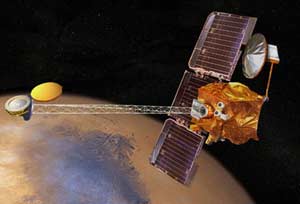(Clearwisdom.net) According to a BBC report on May 26, scientists claim that they have found enormous quantities of water in the form of ice lying just under the surface of Mars.
The finding by the American space agency (NASA) is undoubtedly one of the most important discoveries made about the Red Planet.

The discovery was made by the Mars Odyssey spacecraft
The finding solves one of its deepest mysteries, points the way for manned exploration and reignites the question of whether life may exist on the planet.
Where did the water go?
The dramatic discovery may also guide the selection of future landing and exploration sites on Mars, and may suggest areas to look for evidence of past life.
NASA scientists were scheduled to hold a major news conference on Thursday. Full disclosure of the findings will come in the journal Science later that day.
The discovery was made by the Mars Odyssey spacecraft, which has been gathering data since late last year. This discovery by the Odyssey spacecraft confirmed the scientists' earlier findings that also pointed to enormous reservoirs of ice just below the surface. This finding will answer a question that has puzzled Mars researchers for decades: many lines of evidence suggest that the Red Planet was water-rich in the past, so where did all that water go?
Regolith
The answer appears to be that water is in the regolith - the layer of loose rock and dust on the surface.
The spacecraft contains an instrument called a gamma-ray spectrometer that looks for gamma-rays (high-energy light) with a specific signature showing that they come from hydrogen less than one meter (three feet) beneath the Martian surface.
Astronomers believe that the hydrogen is locked up in crystals of ice.
Researchers were amazed at the strength of the signal of the ice. They had expected to take a year to gather enough evidence but managed to do so in just a few weeks.
They announced preliminary findings in March but now have good data confirming large amounts of the water-ice just beneath the surface south of 60 degrees latitude.
(ref: http://science.nasa.gov/headlines/y2002/28may_marsice.htm
http://newsvote.bbc.co.uk/hi/english/sci/tech/newsid_2009000/2009318.stm)





